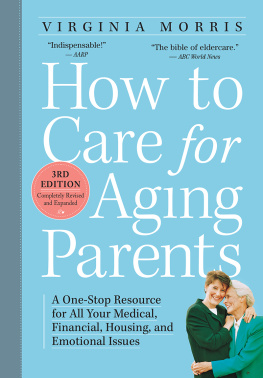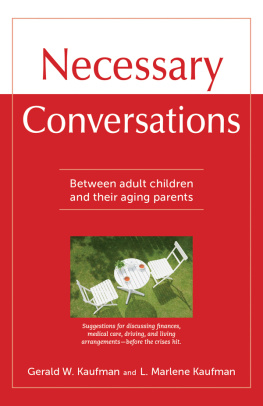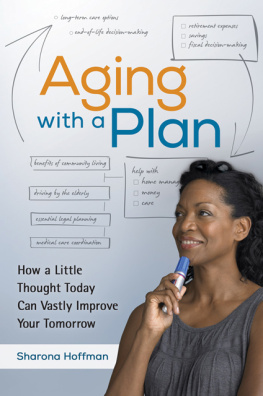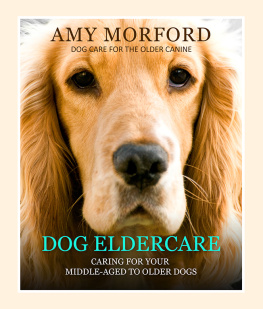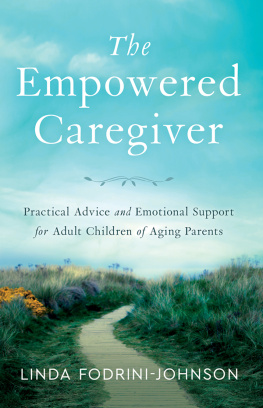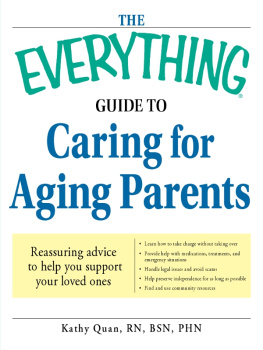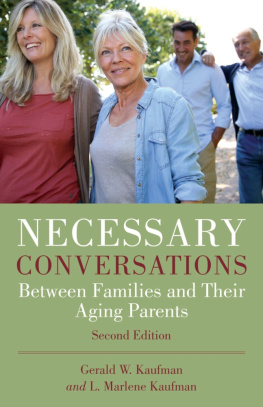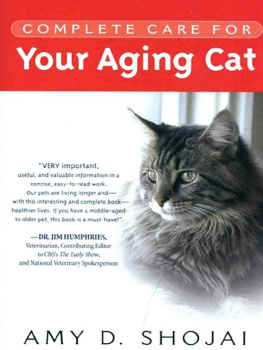How to Care for Aging Parents
A One-Stop Resource for All Your Medical, Financial, Housing, and Emotional Issues
3rd Edition, Completely Revised and Expanded
Virginia Morris
Foreword by Jennie Chin Hansen, CEO, the American Geriatrics Society and Health in Aging Foundation
Workman Publishing New York
To Dr. John McLean Morris (19141993)
In your living, you taught me about courage, determination, philanthropy, and truth. In your dying, you taught me about love. I will miss you, always.
Many Thanks
At the end of one of his comedy shows, Steve Martin said to his audience, Youve been great and Id like to thank each and every one of you. He then proceeded to point to people in the audience saying, Thank you, thank you, thank you, thank you, thank you, thank you, thank you...
I, too, would like to thank each and every person who helped create this bookthe scores of doctors, lawyers, researchers, advocates, and social workers who generously shared their experience, insights, and time; the various experts at groups like the Alzheimers Association, the National Institute on Aging, and AARP, who fielded my questions with patience and thoroughness; and most of all, the hundreds of caregivers who opened their hearts and homes, and shared their joys and sorrows with me. To each and every one of them, I am grateful. But because it is impossible to thank so many individuals here, I have limited my acknowledgments to a few essential players who made this, the third edition of the book, possible.
First and foremost, several people not only took the time to respond to a stream of questions from me, but also reviewed chunks of the manuscript. Amazing. Thank you, thank you, thank you to Dr. Margaret Drickamer, professor of medicine, University of North Carolina, and professor emeritus, Yale School of Medicine; Timothy Casserly, elder law attorney at Burke & Casserly; Robyn Grant, director of public policy and advocacy at the National Consumer Voice for Quality Long-Term Care; and Julie Gray, past president, National Association of Professional Geriatric Care Managers.
Many thanks also to Dr. Marie Bernard, deputy director of the National Institute on Aging; Laurie Orlov, industry analyst at Aging in Place Technology Watch; Dr. Bennett Blum, geriatric psychiatrist and elder abuse expert; and Janice Nadeau, psychologist and author of the book Families Making Sense of Death.
Of course, a veritable army of people at Workman Publishing literally made this book. Thanks to my editor, Margot Herrera, who mysteriously stays calm in any storm, and much appreciation to Mary Wilkinson, Carol White, Janet Vicario, Ariana Abud, and John Jenkinson.
As always, the best must be saved for last. Thank you to my wonderful husband, Bob Plumb, who saw me through (and put up with me through) every step of this project; to Jack and Emma, who are absolutely the best children in the world and heroically handle a mom on a deadline (which is a pretty scary thing); and my four siblings, who are not only family, but better yet, my friends.
To each and every one of you, thank you.
Contents
Foreword
by Jennie Chin Hansen, CEO, the American Geriatrics Society and the Health in Aging Foundation
In 1984, my 74-year-old father had a debilitating stroke that left him unable to continue caring for my mother, who had severe heart disease. At the time, my parents lived in Boston. I was widowed and raising my seven-year-old son in San Francisco. I knew what I wanted to do: I wanted to bring my parents to California to live with me and my son.
I first brought my mother. And when my father was strong enough to make the trip, I was able to bring him to live with us, too. Ill never forget that first night. As I helped my parents into bed, I felt that, if either or both of them died the next day, it would be all right, because I had finally been able to bring them together for the first time in seven months.
With the right care and therapy, my parents quality of life improved. My mother lived for three more years, and my father lived another five wonderful years that were spent getting to know his grandson.
Caring for an older parent is one of the most demanding and one of the most deeply rewarding things youll ever do. I know this from both personal and professional experience. Im the CEO of the American Geriatrics Society and a past president of the AARP. As a nurse and systems developer, I enjoyed years of caring for older people and partnering with other health care providers to create innovative programs that enabled older adults to remain in their homes and communities as long as possible. And of course I had the wonderful privilege of caring for my parents at the end of their lives.
Thanks to decades of breakthroughs in public health, nutrition, and medicine, an unprecedented number of adults are now living into their 80s, 90s, and longer. Odds are you have an elderly parent or parents who need assistance. You also may be raising children or caring for grandchildren. And chances are youre a Baby Boomer. The oldest of us Boomers started turning 65 in 2011 and have now officially reached retirement age. Yet surveys find that few Boomers are planning to stop working any time soon. So a big question for many of us is: How can we give Mom and Dad the care they need, take care of our own health, and juggle our jobs and other responsibilities?
The answer to this difficult question is: with help.
There is simply no way to do it all on your own. The book youre reading provides essential information that can point you toward the help you need. Its easy to understand, painstakingly researched, and comprehensive. Best of all, its warmly empathetic. An award-winning writer, Virginia Morris understands the terrain, because shes covered it herselfshe, too, cared for her parents through the end of their lives.
One of the many things I like about this book is how respectful it is of older people. In the very first chapter, it addresses one of the most difficult parts of caring for a parent: helping Mom and Dad realize that they need assistance. After spending 20 years or so helping you grow up, its understandably hard for them to switch roles. Morris offers advice for making that easier.
You can read the chapters of this book in virtually any order, but I suggest you read , Caring for the Caregiver, first. Taking care of an older parent is a labor of love, but its also complicated, time consuming, demanding, and physically and emotionally draining. To take care of your mother or father, you must take care of yourself too.
I also recommend reading early onthey do a great job of explaining how to work with your parents health care providers to reduce risks of medication side effects and interactions. These are common and often harmful for older people. Morris explains that providing health care for older adults with multiple health problems is, by necessity, a team undertaking that involves physicians, nurses, pharmacists, and other care providersled, typically, by the patients primary care physician: One doctor should keep track of all of her ailments and medications... and coordinate her care so that treatments for one problem dont aggravate another.
which covers what to do when your parent is hospitalizedprovides the right amount of information so you know what to do when the time comes, but not so much that youre overwhelmed. From choosing a hospital through discharge and follow-up, Morris explains what to do and what questions to ask.
The hardest chapter to read is, as you might expect, the chapter called Nearing the End. (You may want to read it in installments for this reason.) Along with information in which focuses on essential legal matters such as power of attorney and advance directivesthis chapter can help ensure that your parents wishes are honored at the end of life. Just as important, the chapter addresses your feelings and needs as your parents life draws to a close.

